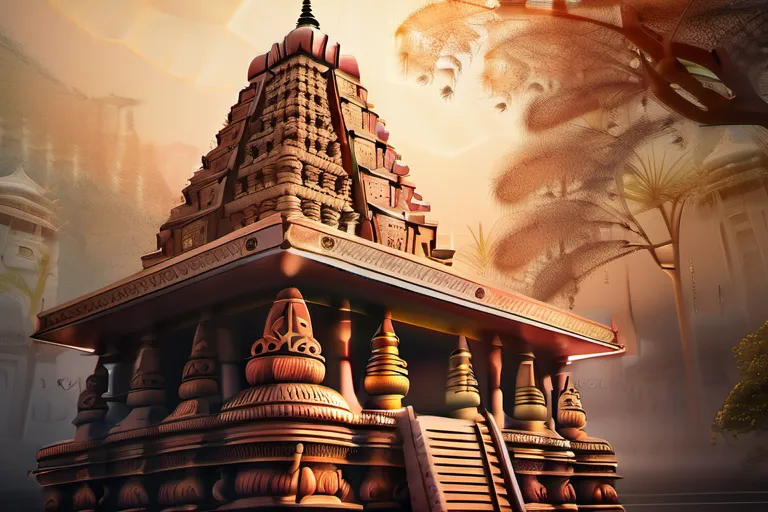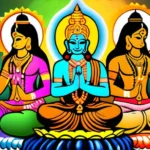Explore the fundamental concept of karma, its origins, types, and impact on reincarnation in Hinduism.
Karma, a Sanskrit term that means ‘action’, is one of the central concepts in Hinduism. This article delves into the intricacies of karma, tracing its roots, understanding its various types, and examining its role in the cycle of reincarnation.
The Origins and Evolution of Karma
How did karma, one of Hinduism’s most profound and complex concepts, come to be? The idea of karma has its roots deep in ancient India, evolving over millennia into a multifaceted philosophy that continues to shape beliefs and practices today.
Origins of Karma
The earliest mentions of karma can be found in the Vedas, sacred texts revered by Hindus. These texts introduced the concept as a natural law governing action and consequence, much like the principle of cause and effect we see in nature. Imagine throwing a stone into a still pond; ripples spread out from the impact, just as actions have repercussions that ripple through life. This early understanding set the stage for karma to be seen as both a moral code and a cosmic force.
Over time, philosophers like Patanjali, author of the Yoga Sutras, refined these ideas. Patanjali presented karma as a series of samskaras—subtle imprints left on our souls by actions—and argued that through spiritual practice and self-reflection, one could transcend the cycle of rebirth.
The Bhagavad Gita, an integral part of the epic Mahabharata, further illustrates karma through its dialogue between Arjuna and Krishna. Here, Krishna explains that true action is performed without attachment to results, likening it to a fisherman who casts his line but remains detached from the outcome. This metaphor of detachment highlights the importance of performing actions without ego or desire for personal gain.
In summary, the evolution of karma in Hinduism reflects a journey from simple natural law to a nuanced philosophical framework that guides ethical living and spiritual progress. As we explore further into its types and impacts, it becomes clear how deeply intertwined this concept is with the very fabric of Hindu thought and practice. What do you think about the profound impact of these early ideas on modern interpretations of karma?
Types of Karma: Good and Bad
Understanding karma in Hinduism involves delving into its intricate types, which shape our lives and destinies in profound ways. Imagine karma as a vast ocean; just like the waves carry different messages, so too do the various types of karma convey their unique influences.
The first type is sanchita karma, which can be likened to the sediment at the bottom of a river. This accumulated karma represents our past actions that have been stored over countless lifetimes, waiting like sleeping giants to affect our present and future. Are you aware of how much impact your past choices hold in shaping your current experiences?
Prarabdha karma, on the other hand, is akin to the current flowing through a river, carrying with it the consequences of actions already taken. This is the portion of sanchita karma that has ripened and is now affecting our lives directly. Have you ever wondered why certain events seem inevitable in your life despite all your efforts?
The third type, kriyamana karma, can be thought of as the water flowing into a river from its tributaries. This refers to actions performed in the present that will shape our future experiences. It’s like planting seeds today for what we hope to harvest tomorrow. Do you often reflect on your daily choices and their potential long-term impacts?
These different types of karma interweave to create a complex tapestry of life. They remind us that every action, no matter how small or large, carries consequences that can ripple through time. As we navigate the intricate pathways of our lives, understanding these forms of karma helps us make conscious choices that align with spiritual growth and harmony.
Karma and Reincarnation: The Cycle of Life
Karma, the intricate web that binds us to our past actions and shapes our future lives, is at the heart of Hinduism’s profound spiritual teachings. Imagine life as a vast garden where each flower represents a soul, and the paths leading between them are the consequences of our deeds. In this garden, karma acts like an unseen gardener, shaping each flower’s growth and beauty based on its unique experiences.
Reincarnation, or metempsychosis, is the process by which souls move from one body to another after death, much like a butterfly transforming from a caterpillar. But what determines the type of life we are reborn into? This is where karma comes in—like a cosmic architect, it decides our next incarnation based on how our current life’s actions have been woven.
Consider for a moment: if you plant seeds of kindness and compassion, do you not expect to reap a harvest of joy and contentment in your future lives? The law of karma asserts that our present circumstances are a direct result of our past actions. So, when you see someone living in prosperity or experiencing suffering, ask yourself, ‘What might have led them there?’
Karma is not just about retribution; it’s also about transformation and growth. Just as the cycle of day and night ensures that darkness eventually gives way to light, so too does karma guide us towards enlightenment through cycles of birth, death, and rebirth. The goal is to cultivate good karma by performing righteous actions and living a life filled with virtue, ultimately leading to liberation from this endless cycle.
In summary, understanding the relationship between karma and reincarnation is key to grasping the deeper meanings in Hinduism. By reflecting on our actions and their consequences, we can take steps towards a more virtuous existence, ensuring that our next life is better than the last—much like planting seeds of wisdom and compassion now for future flowers to bloom.
The Role of Karma in Hindu Ethics
Imagine karma as a river flowing through the heart of Hindu ethics, shaping every action and influencing the course of life itself. How does this ancient concept impact modern-day decision-making? To truly understand its role in guiding ethical behavior, we must first delve into how selfless action (nishkam karma) can lead to spiritual growth.
Nishkam karma emphasizes performing actions without attachment to their outcomes. It’s like planting a seed with the sole intention of nurturing it, not expecting any personal gain from its growth. This principle challenges us to act with pure intentions, stripping away selfish desires and focusing on the greater good. How can one cultivate such selflessness in daily life?
Consider the metaphor of a chess game where each move is carefully thought out yet free from attachment to winning or losing. Just as in a well-played game, every action in life should be mindful and deliberate, but with no expectation of control over its results. This approach not only purifies one’s actions but also aligns them with higher spiritual values.
But why is nishkam karma so crucial? It’s because it fosters a mindset where the focus shifts from personal benefit to collective well-being. When individuals act selflessly, they contribute positively to society without seeking recognition or rewards. This creates a ripple effect that benefits everyone involved, reinforcing the interconnectedness of life.
Moreover, nishkam karma encourages continuous ethical growth and refinement of character. It’s not just about doing good; it’s about doing good for its own sake. This internal transformation is key to achieving spiritual enlightenment in Hinduism. How can you start incorporating selfless actions into your routine?
In essence, nishkam karma is a powerful tool for ethical living, transforming simple actions into steps towards a more enlightened existence. By understanding and embracing this principle, one can navigate the complex world of ethics with greater clarity and purpose.
Karma and Modern Interpretations
As we delve into the realm of karma in Hinduism, it’s fascinating to explore how this ancient concept has evolved and continues to shape modern interpretations. Have you ever pondered why some believe their lives seem predestined, while others see every moment as a choice? Karma offers a unique lens through which we can view fate and free will.
At its core, karma is a belief that actions have consequences. It’s like planting a seed; the type of fruit you harvest depends on what you sow. But in modern times, this idea has been reinterpreted to encompass more than just cause and effect. Some see it as a tool for personal growth, a roadmap to self-improvement.
How does karma interact with free will? Is our destiny written from birth, or can we shape our own path? Many find solace in the notion that while past actions influence future outcomes, every moment is an opportunity to make new choices. This perspective aligns with the Hindu belief that true freedom lies not just in understanding karma but also in actively choosing how we act each day.
Consider this: if you view your life as a series of interconnected events, where each action sets off a chain reaction, how might that change your approach to decision-making? This modern interpretation of karma can serve as a powerful guide for personal development. It encourages us to reflect on our actions and their potential impact not just on ourselves but on others around us.
Moreover, the idea that karma is integral to spiritual growth resonates deeply. Just like a gardener tends to his plants, nurturing them with care to help them grow, we too can cultivate virtues and practices that lead to positive outcomes in our lives. This perspective makes every moment count, turning even the smallest acts of kindness into seeds of future prosperity.
So, as we journey through life, how do you see your role in shaping your destiny? Are you a passive observer or an active participant in the dance of karma? The answers can lead to profound insights and a more fulfilling existence. Embrace the power of your actions today, for they shape not just your tomorrow but your entire path forward.
Living a Karma-Conscious Life
Living a karma-conscious life requires us to understand that every action we take, thought we think, and word we speak has consequences. It’s like sowing seeds in a garden; you can never be sure which flower will bloom or what kind of fruit will eventually ripen. How do we begin this journey? By cultivating compassion for all beings, as our actions affect not just ourselves but everyone around us.
Imagine walking through a dense forest, where every step you take could either open a path to enlightenment or create an obstacle on your spiritual journey. Practicing selfless action, also known as samaskara, means performing tasks without craving for personal gain or recognition. It’s about serving others and the environment with pure intentions, much like watering flowers in someone else’s garden simply because it needs care.
To truly live a karma-conscious life, we must strive for spiritual growth through continuous learning and self-reflection. This involves meditation, studying sacred texts, and engaging in community service. Each step on this path is like climbing the steps of a temple; each one brings us closer to understanding our place in the grand scheme of things.
By embracing these practices, we can navigate life’s complexities with greater wisdom and grace. After all, isn’t it true that every challenge we face is an opportunity for self-improvement? Through karma, we are not just shaping our own destinies but also contributing to the collective well-being of humanity. Will you be ready to take on this noble task?
Conclusion
 By gaining a deeper understanding of karma, we can appreciate the interconnectedness of our actions and their consequences, fostering a sense of responsibility and compassion in our daily lives.
By gaining a deeper understanding of karma, we can appreciate the interconnectedness of our actions and their consequences, fostering a sense of responsibility and compassion in our daily lives.











